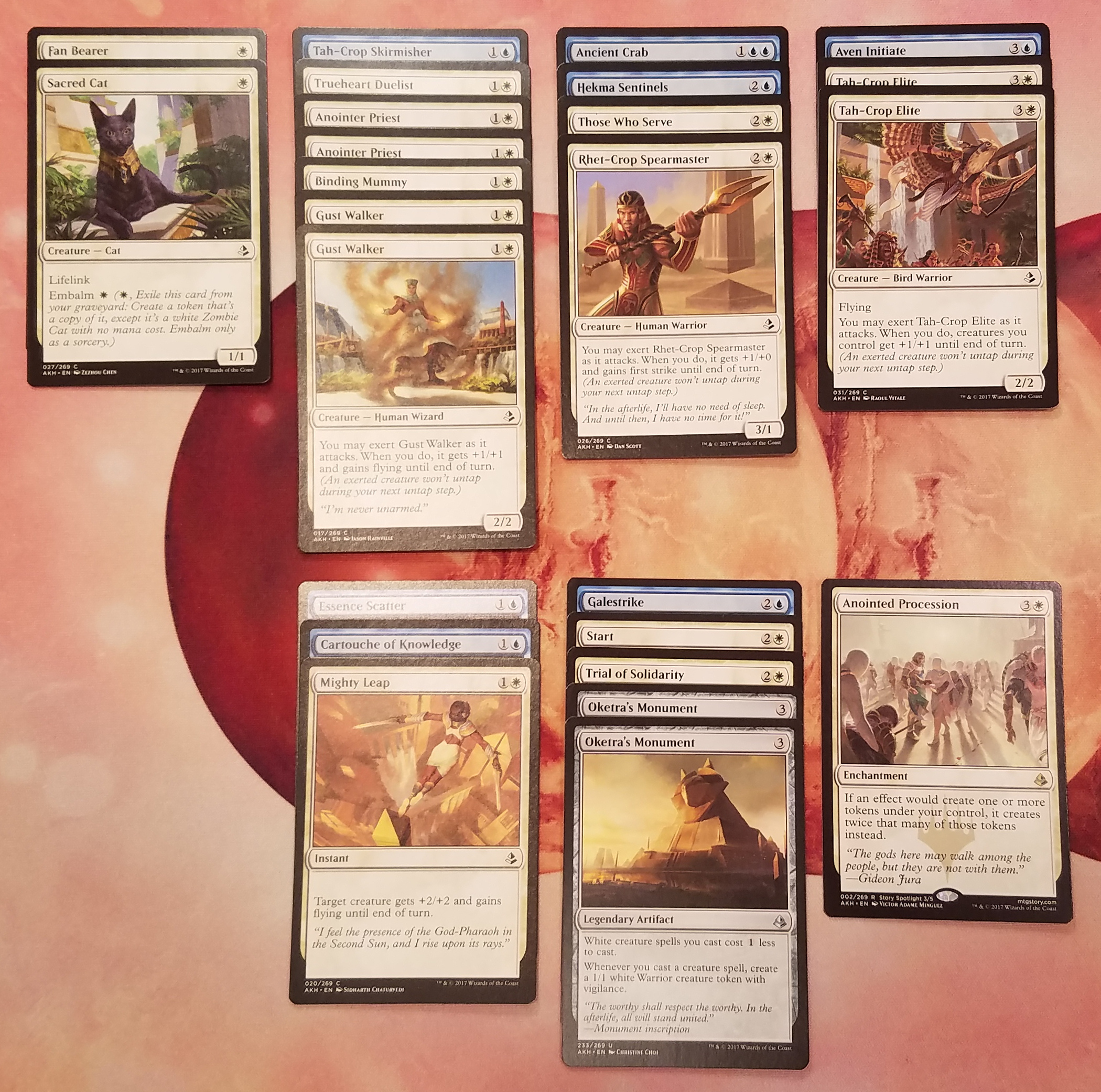
When I came up with the tagline “learning through failure,” I really meant it.
I’ve played Magic: the Gathering in one way or another for most of the game’s history. What started as a fascination with a small collection of cards (because they looked cool) quickly turned into an obsession. Like millions of others over the years, I played countless games around kitchen tables, on carpets and in dorm rooms.
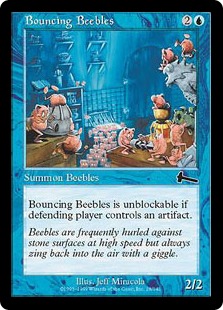
This text needed to be broken up a bit, and Beebles are rad. That is all…
As with most players, my dedication to the game and availability followed the ebb and flow of time. In adulthood, of course, the realities of life kept me away from the game more often than I’d like to admit. I never stopped playing, but I did fall out of sync with the most recent sets at times.
After years of working an incredibly time-hungry job, I found myself in a new career with a more appropriate work-life balance. Most of my friends who played Magic regularly had moved on for various reasons, but I had the insatiable urge to play more regularly. I tiptoed into weekly drafts and other formats at a local shop – where I knew no one – and it wasn’t long before I felt myself sliding back into the realm of obsession.
That’s when I took a step back. This game is amazing, but my time is still limited. Asking myself what I want to get out of dumping time and money into the game, I came to the decision that if it’s worth doing, it’s worth doing right. For me, that means the following:
- I should aim to have fun, and
- I must actively work to improve my skill.
So when I talk about “learning through failure,” my real goal is to get more out of the game by meeting both of the above goals. I am of the strong belief that we should all strive to be life-long learners, and failure is just another opportunity to grow and learn. By thinking about my specific failures in Magic: the Gathering, I’m working to become better at the game. At the same time, this allows me to better separate the strategic part of my brain from the part that used to get angry at losing.
Do I still get salty from time to time at a game loss, a bad draw, or mistakes I make? Of course. But I find it happens less often when I identify these situations as a chance to fill a gap in my knowledge, rather than make excuses to justify my frustration.
With all that said, let’s take a look at this U/W Tokens deck I drafted earlier this month, and see what we can learn from it.
Amonkhet Draft List: U/W Tokens (6-11-2017)
| Creatures (15) 1 Sacred Cat 1 Fan Bearer 2 Gust Walker 1 Binding Mummy 2 Anointer Priest 1 Trueheart Duelist 1 Tah-Crop Skirmisher 1 Rhet-Crop Spearmaster 1 Those Who Serve 1 Hekma Sentinels 2 Tah-Crop Elite 1 Aven Initiate Spells (4) 1 Essence Scatter 1 Mighty Leap 1 Start / Finish 1 Galestrike Enchantments (3) 1 Cartouche of Knowledge 1 Trial of Solidarity 1 Anointed Procession Artifacts (2) 2 Oketra’s Monument | Lands (16) 9 Plains 7 Island |
Deck Tech
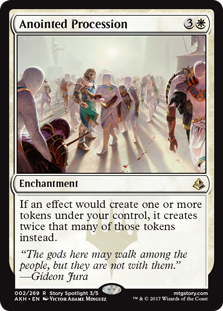
This deck had a lot of stuff you really want in a white go-wide deck. There’s double Gust Walker, double Tah-Crop Elite, plus other aggressive cards like Binding Mummy and Trial of Solidarity. It also has a strong token theme with Anointed Procession, two Oketra’s Monument, Start / Finish and Anointer Priests.
The games I won with this build happened very quickly, often with Tah-Crop Elite pumping on Turn 5 to close things out. Dropping Trial of Solidarity on the same turn giving everything a total +3/+2 was devastating.
That’s not to say the game was all ground work. I was often able to generate enough tokens – with or without Anointed Procession doubling – to chump block turn after turn while sending in the birds. This was also a deck that I think actually benefited greatly from Anointer Priest‘s life gain.
So what went wrong?
As the title of this post implies, I think the main issue with the deck was setup cost. Look at the non-creature spells. Notice anything?
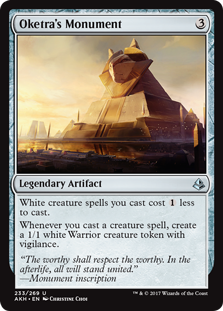
No, you can’t have two.
Yes, that’s six spells in the 4- and 5- drop slots, and virtually no removal. Essence Scatter and Galestrike aren’t nothing, but going wide has a significant issue dealing with opponent’s creatures through combat alone. The result is that if you do not kill your opponent very quickly, you have a significantly lower chance of finishing the game once they stabilize. Against green beatdown decks, for example, this build needs to expend a lot of resources to deal with a single Colossapede.
There’s always a temptation to do something cool when playing Magic: the Gathering, but cool doesn’t always win the game. Having two copies of Oketra’s Monument certainly increases consistency, but being Legendary Artifacts means you will likely end up with a dead card in your hand at some point.
Let’s take a look at one possible way to curve out with this deck…
Turn 1: Sacred Cat
Turn 2: Gust Walker
Turn 3: Oketra’s Monument
Turn 4: Anointed Procession
What do you do on Turn 5 that can make up for the fact that you spent two turns playing permanents that do not immediately impact the board? Sure, you can play two creatures, creating four blockers (and gaining some life if one of the creatures was the Priest). But at this point, your opponent may have four or five creatures, one of which is likely bigger than any one card in the deck can deal with.
It’s a big problem when you have a board full of powerful effects that just don’t do anything. Without strong removal, it does not matter very much how many tokens enter the battlefield, sometimes.
What would I change?
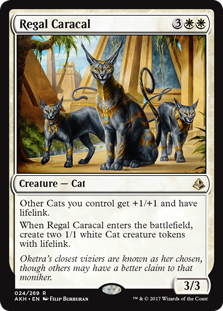 Obviously, removal. If I could, I would replace Anointed Procession with Cast Out and at least one Oketra’s Monument with Impeccable Timing or Compulsory Rest. The go-wide strategy would have had much more success if I could deal with creatures more reliably.
Obviously, removal. If I could, I would replace Anointed Procession with Cast Out and at least one Oketra’s Monument with Impeccable Timing or Compulsory Rest. The go-wide strategy would have had much more success if I could deal with creatures more reliably.
The lesson here is that I need to temper my expectations when trying to do “the cool thing.” My judgment was clouded by that one time I was annihilated by an Anointed Procession deck in limited. My takeaway was that the Procession is a strong build-around card – when in reality, I could have just had a bad deck, poor draws or bad plays when I faced down against half a dozen Regal Caracal tokens.
Even with all that said, this deck wasn’t a total dud. The creatures here took me most of the way to victory, even if the power was watered down a bit with a misguided token effort.